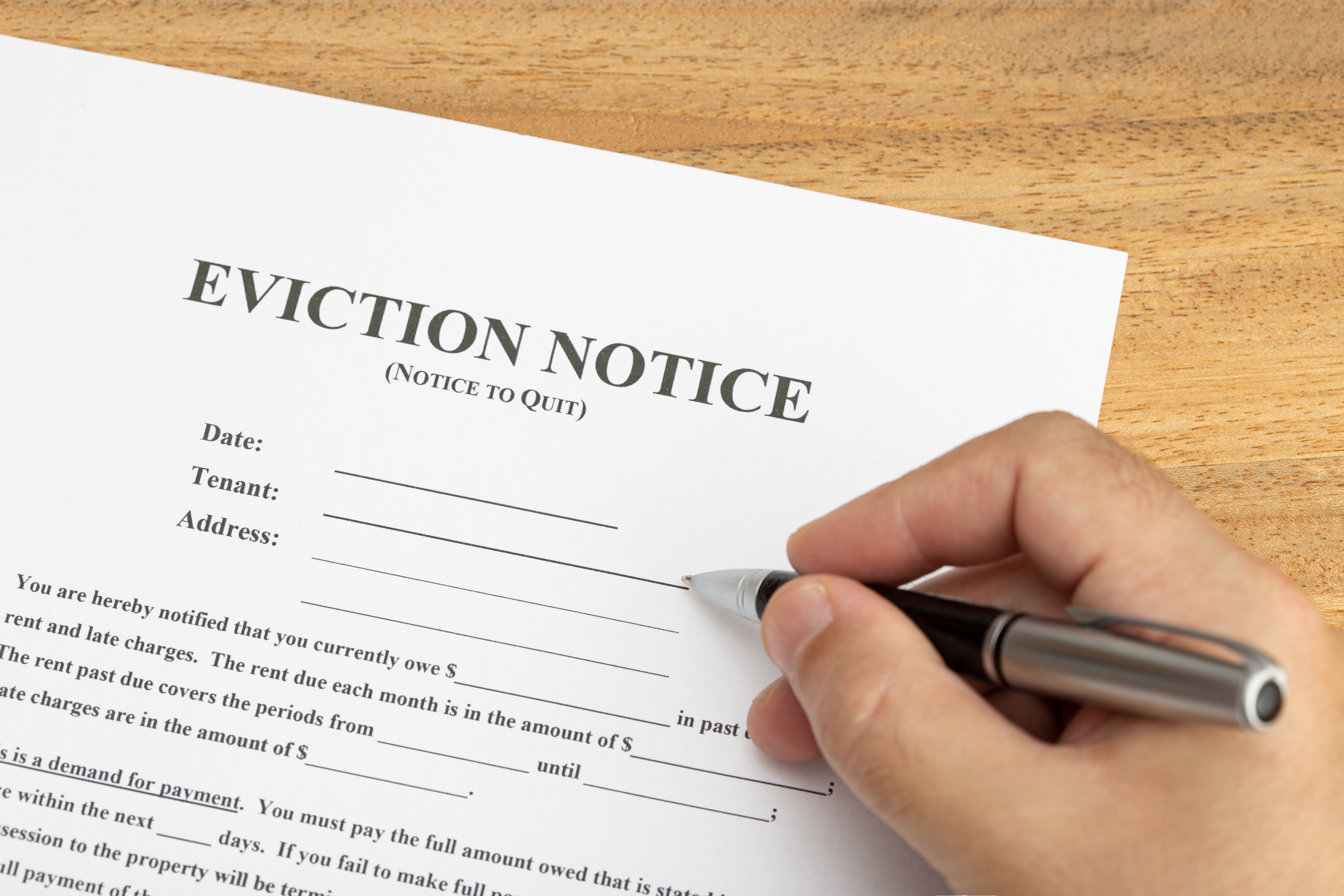What Can Void a Three Day Notice to Pay Rent or Quit in California

Received a three day notice? Don’t panic. Review your lease or rental agreement and understand your rights. If you’re facing the eviction process, seek legal advice to ensure your rights are protected
A 3 Day Notice to Pay Rent or Quit is a legal document giving notice that a landlord can serve to a tenant who is behind on their rent payments in California. The notice gives the tenant three days to either pay the past-due rent or vacate the rental property. If the tenant fails to comply with the notice, the landlord can begin the eviction process. It is important for both landlords and tenants to understand their rights and obligations under the lease or rental agreement and seek legal advice if needed
When To Send the 3 Day Notice to Quit or Comply

Know your rights as a tenant in California! According to California law, a tenant pays rent for the right to occupy a rental unit. Make sure you understand your responsibilities when it comes to paying rent
The 3 Day Notice to Pay Rent or Quit in California must be sent to the tenant when they are late on their rent payment. This notice gives the tenant three days to either pay the rent or move out of the rental property. If the tenant fails to comply with the notice, the landlord can begin the eviction process. It’s important for landlords to follow the proper procedures and seek legal advice if necessary.
When a Tenant Doesn’t Make Rent Payment

The landlord issues a quit notice to a tenant who owes unpaid rent despite proper notice given
In California, when a tenant fails to pay rent, the landlord has the right to deliver a three-day notice to the tenant. This notice demands that the tenant pays the rent owed within three days or vacates the rental unit or property. The three-day notice to pay rent or quit is a legally binding document that serves as a warning to the tenant that legal action will be taken if they do not comply with the original notice.
California law requires landlords to give tenants a three-day notice to pay rent or quit before proceeding with the eviction process. The notice must be written and must include specific details such as the amount of rent owed and the date by which it must be paid.
Additionally, the notice must be properly served to the tenant’s place of, either by delivering it in person, posting it on the rental property, or mailing it to the tenant’s place of last known address.
If the tenant does not pay the rent within the three-day period, the landlord can proceed with the eviction process. This civil procedure typically involves filing an unlawful detainer and filing a lawsuit in court. The tenant will then have the opportunity to respond to the lawsuit and present any defenses they may have. If the court rules in favor of the landlord, a writ of possession will be issued, allowing the landlord to have the tenant forcibly removed from the property.
How to Serve a 3-Day Notice To Pay Rent Or Quit On Rental Agreement

After accepting a partial payment from a tenant who owes rent for their rental unit, the landlord serves a 3-day notice to pay the remaining balance or vacate the property to avoid eviction
To serve a 3-day notice to a tenant who owes to pay rent or quit in California, you should follow these steps:
- Prepare a 3-day notice written notice that includes the tenant’s name and address, the amount of unpaid rent, and the date by which the tenant must pay or vacate the property.
- Make sure that the notice complies with California law, including the language and formatting requirements.
- Serve the notice to the tenant by personal delivery, leaving a copy with someone of suitable age and discretion at the tenant’s residence, or by mailing a copy via certified mail, return receipt requested.
- Keep a copy of the notice and proof of service for your records.
- If the tenant fails to pay the rent or vacate the property within the three-day period, you can file an unlawful detainer lawsuit to evict the tenant.
It’s important to note that the process for serving a 3-day notice to pay rent or quit may vary depending on the specific circumstances of the situation. It’s always a good idea to consult with an attorney or a local housing agency for guidance on how to proceed.
Information Required in the Three-Day Notice to Pay Rent or Quit
The following information is typically required in a 3-day notice to the tenant personally pay rent or quit:
- The tenant’s name and address
- The amount of rent that is due and the date that it was due
- A statement informing the tenant that they have three days to pay the rent in full or vacate the property
- The name, address, and phone number of the landlord or their authorized agent
- The date the notice was served to the tenant
- The signature of the landlord or their authorized agent
It’s important to note that the specific requirements for a three-day notice to pay rent or quit may vary depending on state and local laws. Landlords should always check with local housing authorities or consult with an attorney to ensure that their notice complies with all applicable legal requirements.
When Notice is NOT required

The only legal way for a landlord to collect unpaid amounts from a tenant is through a proper notice served by a process server. Late fees and unpaid rent can add up quickly, but it’s important to follow the legal process and avoid taking matters into your own hands to protect the tenant’s rights and avoid potential legal consequences
Under California law, notice may not be required in certain situations, including:
- The tenant has engaged in criminal activity or violated the lease agreement.
- The tenant has abandoned the rental property.
- The rental property is being sold, and the new owner intends to occupy the property.
- The rental property is in foreclosure, and the landlord has received a notice of foreclosure.
How A 3 Day Notice Can Be Served

Renting a unit is a two-way street – tenants are responsible for paying rent on time, while landlords are responsible for serving tenants and accepting payment. It’s important for both parties to understand their responsibilities and communicate effectively to ensure a positive rental experience
A three-day notice can be served in several ways, including:
- Personal service: The notice can be delivered in person to the tenant by the landlord or their authorized agent. The tenant should sign and date a copy of the notice to acknowledge receipt.
- Substituted service: If the tenant is not available to receive the notice in person, the notice can be left with someone of suitable age and discretion at the tenant’s residence. The person who accepts the notice should be informed of its contents and sign and date a copy of the notice to acknowledge receipt.
- Posting and mailing: If the tenant cannot be served in person or through substituted service, the notice can be posted on the front door of the rental property and mailed to the tenant via first-class mail, postage prepaid.
It’s important to note that the specific requirements for serving a three-day notice may vary depending on state and local laws. Landlords should always check with local fair housing and authorities or consult with an attorney to ensure that they are following all applicable legal requirements.
How a Three-Day Notice to Pay Rent or Quit Must be Delivered
A three-day notice to pay rent or quit must be delivered to the tenant in accordance with state and local laws, which may vary depending on the jurisdiction. In general, the three-day notice to quit should be delivered in one of the following ways:
- Personal service: The notice can be delivered in person to the tenant by the landlord or their authorized agent. The tenant should sign and date a copy of the notice to acknowledge receipt.
- Substituted service: If the tenant is not available to receive the notice in person, the notice can be left with someone of suitable age and discretion at the tenant’s residence. The person who accepts the notice should be informed of its contents and sign and date a copy of the notice to acknowledge receipt.
- Posting and mailing: If the tenant cannot be served in person or through substituted service, the notice can be posted on the front door of the rental property and mailed to the tenant via first-class mail, postage prepaid.
It’s important to note that some jurisdictions may require additional delivery methods or specific language to be included in the notice. Landlords should always check with local housing authorities or consult with an attorney to ensure that they are following all applicable legal requirements.
How to Void Three-Day Notice
To void a three-day notice, tenants may need to take certain steps depending on the situation. If the landlord made an error in the notice or the tenant paid the rent in full before the expiration of the notice period, the notice can be voided.
The tenant should first notify the landlord or their authorized agent as soon as possible and gather any evidence that supports their claim. If the landlord refuses to void the notice, the tenant may need to consult with an attorney who specializes in landlord-tenant law and file a motion to quash with the court.
It’s important to note that the specific requirements for voiding a three-day notice may vary depending on state and local laws. Tenants should always check with local housing authorities or consult with an attorney to ensure that they are following all applicable legal requirements.
Tenant Options After Receiving a Three-Day Notice to Pay Rent or Quit

An unlawful detainer is a legal process that landlords may pursue if tenants fail to pay rent or violate the lease agreement. While some states offer a grace period for late rent payments, landlord attempts to recover unpaid amounts through court papers and an eviction process known as an unlawful detainer
After receiving a three-day notice to pay rent or quit, tenants have several options, including:
- Pay the rent: If the tenant has the funds to do so, they can pay the full amount of rent that is due before the expiration of the notice period. This will allow them to remain in the rental property and avoid eviction.
- Negotiate with the landlord: If the tenant is unable to pay the full amount of rent that is due, they may be able to negotiate a payment plan with the landlord. This can help them avoid eviction and keep their tenancy intact.
- Move out: If the tenant is unable or unwilling to pay the rent that is due, they may choose to move out of the rental property before the expiration of the notice period. This will prevent an eviction from appearing on their record but may result in the loss of their security deposit and other fees.
- Contest the Notice: If the tenant believes that the three-day notice is invalid or that they have been wrongfully charged, they may choose to contest the notice in court. This will require the tenant to present evidence and may result in additional legal fees.
It’s important for tenants to understand their rights and options when receiving a three-day notice to pay rent or quit. They may want to consult with an attorney or local housing agency for guidance on how to proceed.
The Eviction Lawsuit
An eviction lawsuit is a legal proceeding initiated by a landlord to remove a tenant from a rental property. The landlord must first serve the tenant with a notice to quit, which typically gives the tenant a certain amount of time to pay the rent that the landlord accepts is due or vacate the property.
If the tenant fails to comply with the notice to quit, the landlord can file an eviction lawsuit in court. The landlord must provide evidence that the tenant has violated the lease agreement or failed to pay rent as required. The tenant will have the opportunity to respond and present their own evidence in court.
If the court rules in favor of the landlord, a judgment for possession will be issued, and the tenant will be ordered to vacate the property. The tenant may also be ordered to pay any outstanding rent, damages, and legal fees.
If the tenant still fails to vacate the property after a judgment for possession has been issued, the landlord may need to obtain a writ of possession, which authorizes law enforcement to physically remove the tenant from the property.
Eviction laws vary by state and local jurisdiction, and landlords and tenants should always consult with an attorney or local housing agency to ensure that they are following all applicable legal requirements.
Should a Landlord Try To Do The Eviction On Their Own?
It is generally not advisable for a landlord to try to do an eviction on their own. Evictions can be complex legal proceedings, and there are many state and local laws that govern the process. Mistakes made during the eviction process can result in the case being dismissed or the landlord being held liable for damages.
Additionally, landlords may be subject to legal liability if they attempt to evict a tenant in an unlawful or improper manner. This illegal activity can result in the landlord being sued by the tenant and being required to pay damages or other legal fees.
For these reasons, it is typically recommended that landlords seek the advice and guidance of an attorney who specializes in landlord-tenant law. An attorney can help ensure that the eviction process is conducted in accordance with all applicable laws and can provide guidance on how to proceed if the tenant contests the eviction or files a counterclaim.
California 3-Day Eviction Notice For Lease or Rental Agreement
In California, a three-day eviction notice can be used by a landlord to terminate a lease or rental agreement if the tenant has violated the terms of the agreement, such as by failing to pay rent or committing a lease violation. The notice gives the tenant three days to correct the violation or vacate the rental property.
The three-day eviction notice must include the following information:
- The date the notice is being served
- The name of the tenant or tenants
- The address of the rental property
- A description of the violation, including the specific lease term that has been breached
- A statement that the tenant has three days to correct the violation or vacate the property
- The name, address, and phone number of the landlord or their authorized agent
- The date by which the notice must be complied with
- A statement informing the tenant of their right to contest the notice in court
It’s important to note that the three-day eviction notice must be served in accordance with California law. The notice can be served in person, by mail, or by posting it on the rental property and mailing a copy to the tenant. Landlords should always consult with an attorney or local housing agency to ensure that they are following all applicable legal requirements to serve tenants.
Talk to Your Landlord About the Notice – Pay and Stay?

When a tenant fails to make a rent payment, landlords may serve a notice to pay or quit, requiring the tenant to respond within a certain number of business days. The notice should be placed in a conspicuous place and include any applicable late fees. It’s important for tenants to respond promptly to avoid further legal action
If you receive a notice to pay rent or quit from your landlord, it’s important to take immediate action to avoid eviction. One option is to talk to your landlord about the notice and see if you can come to an agreement to pay the rent that is owed.
If you are unable to pay the full amount of rent that is due, you may be able to negotiate a payment plan with your landlord. This can help you avoid eviction and keep your tenancy intact.
It’s important to be proactive and communicate with your landlord as soon as possible. Ignoring the notice or failing to communicate with your landlord can result in the eviction process moving forward, which can have serious consequences for your housing and credit record.
Conclusion
Remember, the goal is to pay the rent that is owed and stay in your rental property. If you are unable to pay the rent or come to an agreement with your landlord, you may need to explore other options such as moving out or contesting the notice in court.
In any case, it’s always recommended to seek the advice and guidance of an attorney or local housing agency to ensure that you are following all applicable laws and protecting your rights as a tenant.
Call or Text our office today for a confidential consultation at (916) 704-3009
As an attorney serving the Sacramento metropolitan area, you have the opportunity to provide your legal expertise to a diverse range of cities in California. This bustling region encompasses cities such as Elk Grove, Roseville, Folsom, Davis, Citrus Heights, Rancho Cordova, Rocklin, West Sacramento, Woodland, and Auburn. Each of these cities has its own unique characteristics and legal needs, presenting you with a wide array of clients and cases. Whether it’s handling business matters, estate planning, real estate transactions, or personal injury cases, your services are essential in assisting individuals and businesses throughout the Sacramento metropolitan area. With your legal knowledge and experience, you can make a significant impact in the lives of those residing in these vibrant communities.













